(ITNTV)Dozens of bodies sheathed in black bags line the floor of an Iranian morgue, while workers in protective suits and masks busily walk among them.
It's unclear which, if any, of the people whose bodies lie in the morgue were infected with the coronavirus gripping the country, in this footage from inside Qom's Behesht-e Masoumeh morgue.
And here lies a huge problem for Iran, which is one of the worst-hit countries outside China, with more than 3,500 people infected and at least 107 dead from the virus, according to officials.
Under Islamic tradition in Iran, corpses are typically washed with soap and water before burial. But two medical workers in Qom told CNN that in some cases precautions related to the outbreak are preventing staff from observing traditional Islamic guidelines for burial.

Social media footage shows bodies in a morgue in Qom, Iran.
Instead, they said the bodies of those confirmed to have coronavirus at the time of death are being treated with calcium oxide, to prevent them from contaminating the soil once buried in cemeteries.
The sources spoke to CNN anonymously, for fear of reprisals from Iran's security apparatus.
Testing for the virus takes time, delaying burials and creating a "pile up" of bodies at the morgue, said Behesht-e Masoumeh morgue director, Ali Ramezani, in a report on Iranian state TV, IRIB.
"What we are dealing with is how to handle the bodies of coronavirus victims versus non-coronavirus victims as the instructions for burial are different," said Ramezani.
He added: "Some families prefer that we keep their deceased, for a day or two, until their test results are completed.
"And if the results come back negative, then there is no need to treat the deceased according to guidelines outlined for coronavirus victims, and the family can bury the deceased wherever they have planned to bury them."
One person has been arrested for allegedly circulating video from inside the morgue, which state broadcaster IRIB confirmed was filmed inside Qom's Behesht-e Masoumeh.
Their case has been referred to the Judiciary, according to a report from Iran's semi-official news agency ISNA.
Friday prayers canceled
The apparent backlog of bodies for burial comes as Iran grapples with a rapid rise in coronavirus cases. The country had 591 new positive cases recorded since Wednesday, the country's health ministry spokesman Kianush Jahanpour said Thursday.
He added that 739 people have also recovered from the virus and left hospital.
All of Iran's 31 provinces have been hit with the virus, the health ministry announced Thursday. The capital Tehran has the highest number at 1,523, while the city of Qom, the reported epicenter of Iran's epidemic, had 386 confirmed cases.
Iran, along with Italy, has the highest recorded number of deaths from the virus outside of China, at 107.

Photos: The novel coronavirus outbreak
The Anthem of the Seas cruise ship is seen docked at the Cape Liberty Cruise Port in Bayonne, New Jersey, on February 7. Passengers were to be screened for coronavirus as a precaution, an official with the Centers for Disease Control and Prevention told CNN.
Hide Caption
50 of 99

Photos: The novel coronavirus outbreak
A light installation is displayed by striking members of the Hospital Authority Employees Alliance and other activists at the Hospital Authority building in Hong Kong on February 7.
Hide Caption
51 of 99

Photos: The novel coronavirus outbreak
Passengers are seen on the deck of the Diamond Princess cruise ship, docked at the Yokohama Port on February 7.
Hide Caption
52 of 99
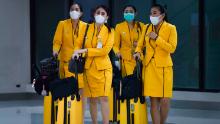
Photos: The novel coronavirus outbreak
Flight attendants wearing face masks make their way through Don Mueang Airport in Bangkok on February 7.
Hide Caption
53 of 99
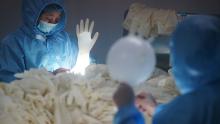
Photos: The novel coronavirus outbreak
Workers check sterile medical gloves at a latex-product manufacturer in Nanjing, China, on February 6.
Hide Caption
54 of 99

Photos: The novel coronavirus outbreak
A woman wears a protective mask as she shops in a Beijing market on February 6.
Hide Caption
55 of 99
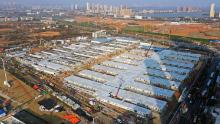
Photos: The novel coronavirus outbreak
This aerial photo shows the Leishenshan Hospital that is being built in Wuhan to handle coronavirus patients.
Hide Caption
56 of 99

Photos: The novel coronavirus outbreak
A passenger shows a note from the World Dream cruise ship docked at the Kai Tak cruise terminal in Hong Kong on February 5.
Hide Caption
57 of 99
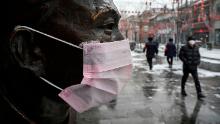
Photos: The novel coronavirus outbreak
A mask is seen on a statue in Beijing on February 5.
Hide Caption
58 of 99
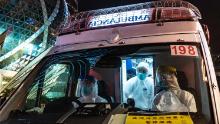
Photos: The novel coronavirus outbreak
An ambulance stops at a traffic light in front of the Grand Lisboa Hotel in Macao. The virus turned China's gambling mecca into a ghost town.
Hide Caption
59 of 99

Photos: The novel coronavirus outbreak
A dog in Beijing wears a makeshift mask constructed from a paper cup.
Hide Caption
60 of 99

Photos: The novel coronavirus outbreak
Striking hospital workers in Hong Kong demand the closure of the border with mainland China on February 4.
Hide Caption
61 of 99

Photos: The novel coronavirus outbreak
The Diamond Princess cruise ship sits anchored in quarantine off the port of Yokohama on February 4. It arrived a day earlier with passengers feeling ill.
Hide Caption
62 of 99
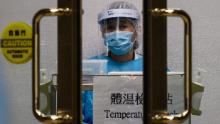
Photos: The novel coronavirus outbreak
A medical worker wearing protective gear waits to take the temperature of people entering Princess Margaret Hospital in Hong Kong on February 4.
Hide Caption
63 of 99
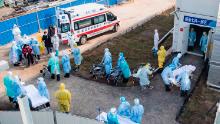
Photos: The novel coronavirus outbreak
Medical workers in protective suits help transfer patients to a newly completed field hospital in Wuhan.
Hide Caption
64 of 99
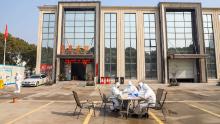
Photos: The novel coronavirus outbreak
People wearing protective overalls talk outside a Wuhan hotel housing people in isolation on February 3.
Hide Caption
65 of 99

Photos: The novel coronavirus outbreak
A man stands in front of TV screens broadcasting a speech by Hong Kong Chief Executive Carrie Lam on February 3. Lam said the city would shut almost all border-control points to the mainland.
Hide Caption
66 of 99
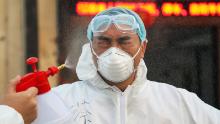
Photos: The novel coronavirus outbreak
A colleague sprays disinfectant on a doctor in Wuhan on February 3.
Hide Caption
67 of 99

Photos: The novel coronavirus outbreak
Commuters in Tokyo walk past an electric board displaying dismal stock prices on February 3, the first business day after the Chinese New Year. Asia's markets recorded their worst day in years as investors finally got a chance to react to the worsening coronavirus outbreak.
Hide Caption
68 of 99
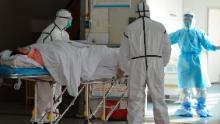
Photos: The novel coronavirus outbreak
Medical workers move a coronavirus patient into an isolation ward at the Second People's Hospital in Fuyang, China, on February 1.
Hide Caption
69 of 99
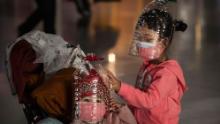
Photos: The novel coronavirus outbreak
Children wear plastic bottles as makeshift masks while waiting to check in to a flight at the Beijing Capital Airport on January 30.
Hide Caption
70 of 99
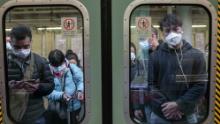
Photos: The novel coronavirus outbreak
Passengers in Hong Kong wear protective masks as they wait to board a train at Lo Wu Station, near the mainland border, on January 30.
Hide Caption
71 of 99
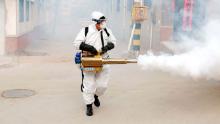
Photos: The novel coronavirus outbreak
A volunteer wearing protective clothing disinfects a street in Qingdao, China, on January 29.
Hide Caption
72 of 99

Photos: The novel coronavirus outbreak
Nanning residents line up to buy face masks from a medical appliance store on January 29.
Hide Caption
73 of 99
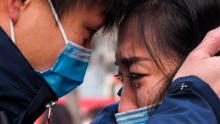
Photos: The novel coronavirus outbreak
Lyu Jun, left, a member of a medical team leaving for Wuhan, says goodbye to a loved one in Urumqi, China, on January 28.
Hide Caption
74 of 99

Photos: The novel coronavirus outbreak
A charter flight from Wuhan arrives at an airport in Anchorage, Alaska, on January 28. The US government chartered the plane to bring home US citizens and diplomats from the American consulate in Wuhan.
Hide Caption
75 of 99
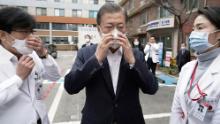
Photos: The novel coronavirus outbreak
South Korean President Moon Jae-in wears a mask to inspect the National Medical Center in Seoul on January 28.
Hide Caption
76 of 99

Photos: The novel coronavirus outbreak
Hong Kong Chief Executive Carrie Lam, center, attends a news conference in Hong Kong on January 28. Lam said China will stop individual travelers to Hong Kong while closing some border checkpoints and restricting flights and train services from the mainland.
Hide Caption
77 of 99
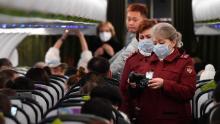
Photos: The novel coronavirus outbreak
Workers at an airport in Novosibirsk, Russia, check the temperatures of passengers who arrived from Beijing on January 28.
Hide Caption
78 of 99

Photos: The novel coronavirus outbreak
Alex Azar, the US Secretary of Health and Human Services, speaks during a news conference about the American public-health response.
Hide Caption
79 of 99

Photos: The novel coronavirus outbreak
Two residents walk in an empty park in Wuhan on January 27. The city remained on lockdown for a fourth day.
Hide Caption
80 of 99
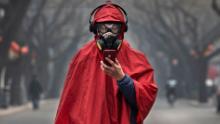
Photos: The novel coronavirus outbreak
A person wears a protective mask, goggles and coat as he stands in a nearly empty street in Beijing on January 26.
Hide Caption
81 of 99
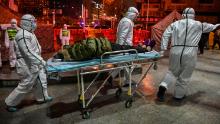
Photos: The novel coronavirus outbreak
Medical staff members bring a patient to the Wuhan Red Cross hospital on January 25.
Hide Caption
82 of 99

Photos: The novel coronavirus outbreak
People wear protective masks as they walk under Lunar New Year decorations in Beijing on January 25.
Hide Caption
83 of 99
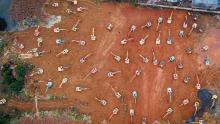
Photos: The novel coronavirus outbreak
Construction workers in Wuhan begin to work on a special hospital to deal with the outbreak on January 24.
Hide Caption
84 of 99

Photos: The novel coronavirus outbreak
Dr. Allison Arwady, commissioner of the Chicago Department of Public Health, speaks to reporters on January 24 about a patient in Chicago who had been diagnosed with the coronavirus. The patient was the second in the United States to be diagnosed with the illness.
Hide Caption
85 of 99

Photos: The novel coronavirus outbreak
A couple kisses goodbye as they travel for the Lunar New Year holiday in Beijing on January 24.
Hide Caption
86 of 99
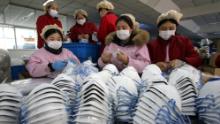
Photos: The novel coronavirus outbreak
Workers manufacture protective face masks at a factory in China's Hubei Province on January 23.
Hide Caption
87 of 99

Photos: The novel coronavirus outbreak
Shoppers wear masks in a Wuhan market on January 23.
Hide Caption
88 of 99
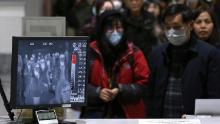
Photos: The novel coronavirus outbreak
Passengers are checked by a thermography device at an airport in Osaka, Japan, on January 23.
Hide Caption
89 of 99

Photos: The novel coronavirus outbreak
People wear masks while shopping for vegetables in Wuhan on January 23.
Hide Caption
90 of 99

Photos: The novel coronavirus outbreak
A militia member checks the body temperature of a driver in Wuhan on January 23.
Hide Caption
91 of 99
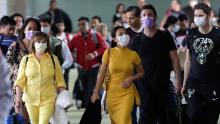
Photos: The novel coronavirus outbreak
Passengers wear masks as they arrive at the Ninoy Aquino International Airport in Manila, Philippines, on January 23.
Hide Caption
92 of 99

Photos: The novel coronavirus outbreak
A customer holds boxes of particulate respirators at a pharmacy in Hong Kong on January 23.
Hide Caption
93 of 99
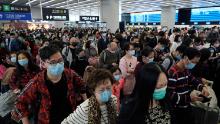
Photos: The novel coronavirus outbreak
Passengers wear masks at the high-speed train station in Hong Kong on January 23.
Hide Caption
94 of 99

Photos: The novel coronavirus outbreak
A woman rides an electric bicycle in Wuhan on January 22.
Hide Caption
95 of 99
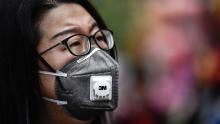
Photos: The novel coronavirus outbreak
People in Guangzhou, China, wear protective masks on January 22.
Hide Caption
96 of 99

Photos: The novel coronavirus outbreak
People go through a checkpoint in Guangzhou on January 22.
Hide Caption
97 of 99

Photos: The novel coronavirus outbreak
Medical staff of Wuhan's Union Hospital attend a gathering on January 22.
Hide Caption
98 of 99

Photos: The novel coronavirus outbreak
Health officials hold a news conference in Beijing on January 22.
Hide Caption
99 of 99

Photos: The novel coronavirus outbreak
Sumo wrestlers attend the spring grand sumo tournament held behind closed doors due to the outbreak of the coronavirus in Osaka, Japan, on Sunday, March 8.
Hide Caption
1 of 99
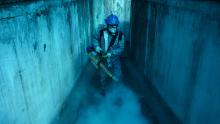
Photos: The novel coronavirus outbreak
A volunteer from Blue Sky Rescue uses fumigation equipment to disinfect a residential compound in Beijing on March 5.
Hide Caption
2 of 99

Photos: The novel coronavirus outbreak
Airmen from the California National Guard drop coronavirus testing kits down to the Grand Princess cruise ship off the coast of California on March 5. The ship previously carried a passenger who became the first person to die from coronavirus in California, resulting in the passengers and crew to be quarantined.
Hide Caption
3 of 99
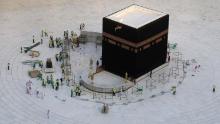
Photos: The novel coronavirus outbreak
Municipal workers are seen at the Kaaba, inside Mecca's Grand Mosque, on March 5. Saudi Arabia emptied Islam's holiest site for sterilization over coronavirus fears, an unprecedented move after the kingdom suspended the year-round Umrah pilgrimage.
Hide Caption
4 of 99
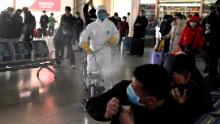
Photos: The novel coronavirus outbreak
Passengers react as a worker wearing a protective suit disinfects the departure area of a railway station in Hefei, China, on Wednesday, March 4.
Hide Caption
5 of 99

Photos: The novel coronavirus outbreak
Teachers at the Nagoya International School in Japan conduct an online class for students staying at home as a precaution against the spread of coronavirus.
Hide Caption
6 of 99
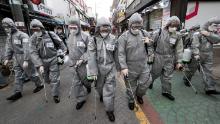
Photos: The novel coronavirus outbreak
Soldiers spray disinfectant throughout a shopping street in Seoul, South Korea.
Hide Caption
7 of 99
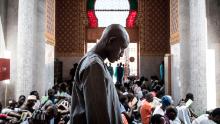
Photos: The novel coronavirus outbreak
A Muslim worshipper attends a mass prayer against coronavirus in Dakar, Senegal, on March 4. It was after cases were confirmed in the country.
Hide Caption
8 of 99

Photos: The novel coronavirus outbreak
People wear face masks in New York's Times Square on Tuesday, March 3. New York reported its first case of coronavirus two days earlier.
Hide Caption
9 of 99

Photos: The novel coronavirus outbreak
A security guard stands on the Shibuya Sky observation deck in Tokyo on March 3.
Hide Caption
10 of 99

Photos: The novel coronavirus outbreak
US President Donald Trump, flanked by Vice President Mike Pence, left, and Health and Human Services Secretary Alex Azar, speaks during a meeting with pharmaceutical executives and the White House coronavirus task force on Monday, March 2. Throughout the meeting, Trump was hyperfocused on pressing industry leaders in the room for a timeline for a coronavirus vaccine and treatment. But experts at the table -- from the administration and the pharmaceutical industry -- repeatedly emphasized that a vaccine can't be rushed to market before it's been declared safe for the public.
Hide Caption
11 of 99
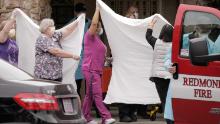
Photos: The novel coronavirus outbreak
Healthcare workers transfer a patient at the Life Care Center in Kirkland, Washington, on Sunday, March 1. The long-term care facility is linked to confirmed coronavirus cases.
Hide Caption
12 of 99
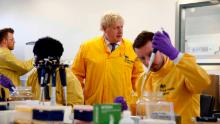
Photos: The novel coronavirus outbreak
British Prime Minister Boris Johnson visits a London laboratory of the Public Health England National Infection Service.
Hide Caption
13 of 99

Photos: The novel coronavirus outbreak
Staff members disinfect the premises of a makeshift hospital in Wuhan, China, on March 1, after all patients were discharged.
Hide Caption
14 of 99
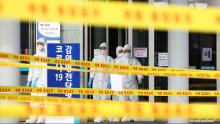
Photos: The novel coronavirus outbreak
Medical staff stand outside a hospital in Daegu, South Korea, on March 1.
Hide Caption
15 of 99

Photos: The novel coronavirus outbreak
Tomoyuki Sugano, a professional baseball player on the Yomiuri Giants, throws a pitch in an empty Tokyo Dome during a preseason game on Saturday, February 29. Fans have been barred from preseason games to prevent the spread of the coronavirus.
Hide Caption
16 of 99
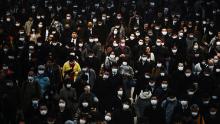
Photos: The novel coronavirus outbreak
Commuters wearing masks make their way to work during morning rush hour at the Shinagawa train station in Tokyo on February 28.
Hide Caption
17 of 99
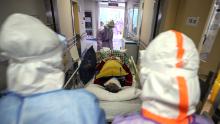
Photos: The novel coronavirus outbreak
Medical staff transport a coronavirus patient within the Red Cross hospital in Wuhan on February 28.
Hide Caption
18 of 99

Photos: The novel coronavirus outbreak
Inter Milan plays Ludogorets in an empty soccer stadium in Milan, Italy, on February 27. The match was ordered to be played behind closed doors as Italian authorities continue to grapple with the coronavirus outbreak.
Hide Caption
19 of 99
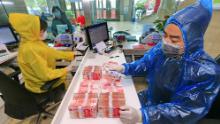
Photos: The novel coronavirus outbreak
A bank clerk disinfects banknotes in China's Sichuan province on February 26.
Hide Caption
20 of 99
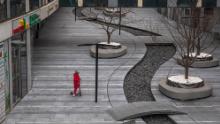
Photos: The novel coronavirus outbreak
A child wearing a protective face mask rides on a scooter in an empty area in Beijing.
Hide Caption
21 of 99
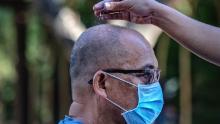
Photos: The novel coronavirus outbreak
A Catholic devotee wears a face mask as he is sprinkled with ash during Ash Wednesday services in Paranaque, Philippines, on February 26.
Hide Caption
22 of 99
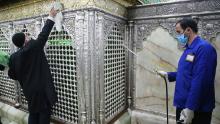
Photos: The novel coronavirus outbreak
People disinfect Qom's Masumeh shrine in Tehran, Iran, on February 25.
Hide Caption
23 of 99
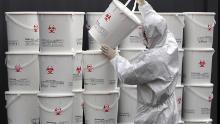
Photos: The novel coronavirus outbreak
A worker in Daegu stacks plastic buckets containing medical waste from coronavirus patients on February 24.
Hide Caption
24 of 99

Photos: The novel coronavirus outbreak
Paramedics carry a stretcher off an ambulance in Hong Kong on February 23.
Hide Caption
25 of 99
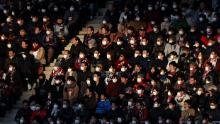
Photos: The novel coronavirus outbreak
People attend a professional soccer match in Kobe, Japan, on February 23. To help stop the spread of the novel coronavirus, the soccer club Vissel Kobe told fans not to sing, chant or wave flags in the season opener against Yokohama FC.
Hide Caption
26 of 99
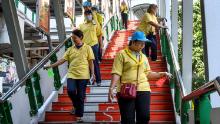
Photos: The novel coronavirus outbreak
A team of volunteers disinfects a pedestrian bridge in Bangkok, Thailand.
Hide Caption
27 of 99

Photos: The novel coronavirus outbreak
A man rides his bike in Beijing on February 23.
Hide Caption
28 of 99
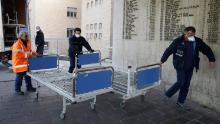
Photos: The novel coronavirus outbreak
Hospital personnel in Codogno, Italy, carry new beds inside the hospital on February 21. The hospital is hosting some people who have been diagnosed with the novel coronavirus.
Hide Caption
29 of 99
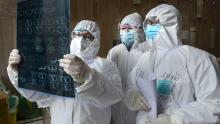
Photos: The novel coronavirus outbreak
Doctors look at a CT scan of a lung at a hospital in Xiaogan, China, on February 20.
Hide Caption
30 of 99

Photos: The novel coronavirus outbreak
A sales clerk wears a mask as she waits for customers at a hat shop in Beijing on February 18. Small companies that help drive China's economy are worried about how much damage the coronavirus outbreak will cause to business.
Hide Caption
31 of 99

Photos: The novel coronavirus outbreak
Buses carrying American passengers arrive at the Haneda Airport in Tokyo on February 17. The passengers were leaving the quarantined Diamond Princess cruise ship to be repatriated to the United States.
Hide Caption
32 of 99
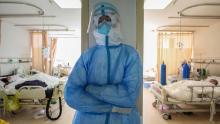
Photos: The novel coronavirus outbreak
A medical worker rests at the isolation ward of the Red Cross hospital in Wuhan on February 16.
Hide Caption
33 of 99

Photos: The novel coronavirus outbreak
Authorities watch as the Westerdam cruise ship approaches a port in Sihanoukville, Cambodia, on February 13. Despite having no confirmed cases of coronavirus on board, the Westerdam was refused port by four other Asian countries before being allowed to dock in Cambodia.
Hide Caption
34 of 99

Photos: The novel coronavirus outbreak
A worker has his temperature checked on a shuttered commercial street in Beijing on February 12.
Hide Caption
35 of 99

Photos: The novel coronavirus outbreak
Beds are made in the Wuhan Sports Center, which has been converted into a temporary hospital.
Hide Caption
36 of 99
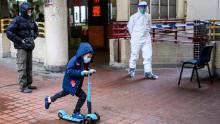
Photos: The novel coronavirus outbreak
A child rides a scooter past a police officer wearing protective gear outside the Hong Mei House in Hong Kong on February 11. More than 100 people evacuated the housing block after four residents in two different apartments tested positive for the coronavirus.
Hide Caption
37 of 99

Photos: The novel coronavirus outbreak
Relatives of quarantined passengers wave at the Diamond Princess cruise ship as it leaves a port in Yokohama, Japan, to dump wastewater and generate potable water. Dozens of people on the ship were infected with coronavirus.
Hide Caption
38 of 99

Photos: The novel coronavirus outbreak
The Deneway branch of the County Oak Medical Centre is closed amid coronavirus fears in Brighton, England, on February 11. Several locations in and around Brighton were quarantined after a man linked to several coronavirus cases in the United Kingdom came into contact with health-care workers and members of the public.
Hide Caption
39 of 99
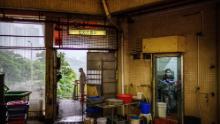
Photos: The novel coronavirus outbreak
A police officer, left, wears protective gear as he guards a cordon at the Hong Mei House in Hong Kong on February 11.
Hide Caption
40 of 99
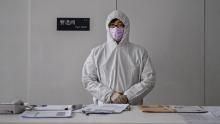
Photos: The novel coronavirus outbreak
A worker wears a protective suit as he waits to screen people entering an office building in Beijing on February 10. China's workforce is slowly coming back to work after the coronavirus outbreak forced many parts of the country to extend the Lunar New Year holiday by more than a week.
Hide Caption
41 of 99
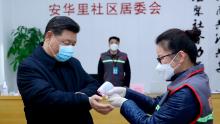
Photos: The novel coronavirus outbreak
Chinese President Xi Jinping has his temperature checked during an appearance in Beijing on February 10.
Hide Caption
42 of 99

Photos: The novel coronavirus outbreak
Photojournalists wearing face masks take photos of a bus carrying passengers after they disembarked from the World Dream cruise ship in Hong Kong on February 9. More than 5,300 people were quarantined on two cruise ships off Hong Kong and Japan.
Hide Caption
43 of 99

Photos: The novel coronavirus outbreak
People participating in a Lunar New Year Parade in New York City hold signs reading, "Wuhan stay strong!" on February 9.
Hide Caption
44 of 99

Photos: The novel coronavirus outbreak
A shopper walks past empty shelves at a grocery store in Hong Kong on February 9. China's Ministry of Commerce encouraged supermarkets and grocery stores to resume operations as the country's voluntary or mandatory quarantines began to take an economic toll.
Hide Caption
45 of 99

Photos: The novel coronavirus outbreak
A worker wearing a protective suit uses a machine to disinfect a business establishment in Shanghai, China, on February 9.
Hide Caption
46 of 99
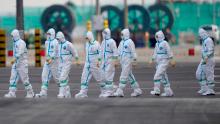
Photos: The novel coronavirus outbreak
Workers in protective gear walk near the Diamond Princess cruise ship docked in Yokohama on February 7.
Hide Caption
47 of 99

Photos: The novel coronavirus outbreak
People in Hong Kong attend a vigil February 7 for whistleblower doctor Li Wenliang. Li, 34, died in Wuhan after contracting the virus while treating a patient.
Hide Caption
48 of 99
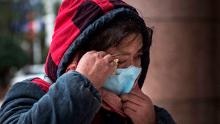
Photos: The novel coronavirus outbreak
A woman grieves while paying tribute to Li at Li's hospital in Wuhan on February 7.
Hide Caption
49 of 99

Photos: The novel coronavirus outbreak
The Anthem of the Seas cruise ship is seen docked at the Cape Liberty Cruise Port in Bayonne, New Jersey, on February 7. Passengers were to be screened for coronavirus as a precaution, an official with the Centers for Disease Control and Prevention told CNN.
Hide Caption
50 of 99

Photos: The novel coronavirus outbreak
A light installation is displayed by striking members of the Hospital Authority Employees Alliance and other activists at the Hospital Authority building in Hong Kong on February 7.
Hide Caption
51 of 99

Photos: The novel coronavirus outbreak
Passengers are seen on the deck of the Diamond Princess cruise ship, docked at the Yokohama Port on February 7.
Hide Caption
52 of 99

Photos: The novel coronavirus outbreak
Flight attendants wearing face masks make their way through Don Mueang Airport in Bangkok on February 7.
Hide Caption
53 of 99

Photos: The novel coronavirus outbreak
Workers check sterile medical gloves at a latex-product manufacturer in Nanjing, China, on February 6.
Hide Caption
54 of 99

Photos: The novel coronavirus outbreak
A woman wears a protective mask as she shops in a Beijing market on February 6.
Hide Caption
55 of 99

Photos: The novel coronavirus outbreak
This aerial photo shows the Leishenshan Hospital that is being built in Wuhan to handle coronavirus patients.
Hide Caption
56 of 99

Photos: The novel coronavirus outbreak
A passenger shows a note from the World Dream cruise ship docked at the Kai Tak cruise terminal in Hong Kong on February 5.
Hide Caption
57 of 99

Photos: The novel coronavirus outbreak
A mask is seen on a statue in Beijing on February 5.
Hide Caption
58 of 99

Photos: The novel coronavirus outbreak
An ambulance stops at a traffic light in front of the Grand Lisboa Hotel in Macao. The virus turned China's gambling mecca into a ghost town.
Hide Caption
59 of 99

Photos: The novel coronavirus outbreak
A dog in Beijing wears a makeshift mask constructed from a paper cup.
Hide Caption
60 of 99

Photos: The novel coronavirus outbreak
Striking hospital workers in Hong Kong demand the closure of the border with mainland China on February 4.
Hide Caption
61 of 99

Photos: The novel coronavirus outbreak
The Diamond Princess cruise ship sits anchored in quarantine off the port of Yokohama on February 4. It arrived a day earlier with passengers feeling ill.
Hide Caption
62 of 99

Photos: The novel coronavirus outbreak
A medical worker wearing protective gear waits to take the temperature of people entering Princess Margaret Hospital in Hong Kong on February 4.
Hide Caption
63 of 99

Photos: The novel coronavirus outbreak
Medical workers in protective suits help transfer patients to a newly completed field hospital in Wuhan.
Hide Caption
64 of 99

Photos: The novel coronavirus outbreak
People wearing protective overalls talk outside a Wuhan hotel housing people in isolation on February 3.
Hide Caption
65 of 99

Photos: The novel coronavirus outbreak
A man stands in front of TV screens broadcasting a speech by Hong Kong Chief Executive Carrie Lam on February 3. Lam said the city would shut almost all border-control points to the mainland.
Hide Caption
66 of 99

Photos: The novel coronavirus outbreak
A colleague sprays disinfectant on a doctor in Wuhan on February 3.
Hide Caption
67 of 99

Photos: The novel coronavirus outbreak
Commuters in Tokyo walk past an electric board displaying dismal stock prices on February 3, the first business day after the Chinese New Year. Asia's markets recorded their worst day in years as investors finally got a chance to react to the worsening coronavirus outbreak.
Hide Caption
68 of 99

Photos: The novel coronavirus outbreak
Medical workers move a coronavirus patient into an isolation ward at the Second People's Hospital in Fuyang, China, on February 1.
Hide Caption
69 of 99

Photos: The novel coronavirus outbreak
Children wear plastic bottles as makeshift masks while waiting to check in to a flight at the Beijing Capital Airport on January 30.
Hide Caption
70 of 99

Photos: The novel coronavirus outbreak
Passengers in Hong Kong wear protective masks as they wait to board a train at Lo Wu Station, near the mainland border, on January 30.
Hide Caption
71 of 99

Photos: The novel coronavirus outbreak
A volunteer wearing protective clothing disinfects a street in Qingdao, China, on January 29.
Hide Caption
72 of 99

Photos: The novel coronavirus outbreak
Nanning residents line up to buy face masks from a medical appliance store on January 29.
Hide Caption
73 of 99

Photos: The novel coronavirus outbreak
Lyu Jun, left, a member of a medical team leaving for Wuhan, says goodbye to a loved one in Urumqi, China, on January 28.
Hide Caption
74 of 99

Photos: The novel coronavirus outbreak
A charter flight from Wuhan arrives at an airport in Anchorage, Alaska, on January 28. The US government chartered the plane to bring home US citizens and diplomats from the American consulate in Wuhan.
Hide Caption
75 of 99

Photos: The novel coronavirus outbreak
South Korean President Moon Jae-in wears a mask to inspect the National Medical Center in Seoul on January 28.
Hide Caption
76 of 99

Photos: The novel coronavirus outbreak
Hong Kong Chief Executive Carrie Lam, center, attends a news conference in Hong Kong on January 28. Lam said China will stop individual travelers to Hong Kong while closing some border checkpoints and restricting flights and train services from the mainland.
Hide Caption
77 of 99

Photos: The novel coronavirus outbreak
Workers at an airport in Novosibirsk, Russia, check the temperatures of passengers who arrived from Beijing on January 28.
Hide Caption
78 of 99

Photos: The novel coronavirus outbreak
Alex Azar, the US Secretary of Health and Human Services, speaks during a news conference about the American public-health response.
Hide Caption
79 of 99

Photos: The novel coronavirus outbreak
Two residents walk in an empty park in Wuhan on January 27. The city remained on lockdown for a fourth day.
Hide Caption
80 of 99

Photos: The novel coronavirus outbreak
A person wears a protective mask, goggles and coat as he stands in a nearly empty street in Beijing on January 26.
Hide Caption
81 of 99

Photos: The novel coronavirus outbreak
Medical staff members bring a patient to the Wuhan Red Cross hospital on January 25.
Hide Caption
82 of 99

Photos: The novel coronavirus outbreak
People wear protective masks as they walk under Lunar New Year decorations in Beijing on January 25.
Hide Caption
83 of 99

Photos: The novel coronavirus outbreak
Construction workers in Wuhan begin to work on a special hospital to deal with the outbreak on January 24.
Hide Caption
84 of 99

Photos: The novel coronavirus outbreak
Dr. Allison Arwady, commissioner of the Chicago Department of Public Health, speaks to reporters on January 24 about a patient in Chicago who had been diagnosed with the coronavirus. The patient was the second in the United States to be diagnosed with the illness.
Hide Caption
85 of 99

Photos: The novel coronavirus outbreak
A couple kisses goodbye as they travel for the Lunar New Year holiday in Beijing on January 24.
Hide Caption
86 of 99

Photos: The novel coronavirus outbreak
Workers manufacture protective face masks at a factory in China's Hubei Province on January 23.
Hide Caption
87 of 99

Photos: The novel coronavirus outbreak
Shoppers wear masks in a Wuhan market on January 23.
Hide Caption
88 of 99

Photos: The novel coronavirus outbreak
Passengers are checked by a thermography device at an airport in Osaka, Japan, on January 23.
Hide Caption
89 of 99

Photos: The novel coronavirus outbreak
People wear masks while shopping for vegetables in Wuhan on January 23.
Hide Caption
90 of 99

Photos: The novel coronavirus outbreak
A militia member checks the body temperature of a driver in Wuhan on January 23.
Hide Caption
91 of 99

Photos: The novel coronavirus outbreak
Passengers wear masks as they arrive at the Ninoy Aquino International Airport in Manila, Philippines, on January 23.
Hide Caption
92 of 99

Photos: The novel coronavirus outbreak
A customer holds boxes of particulate respirators at a pharmacy in Hong Kong on January 23.
Hide Caption
93 of 99

Photos: The novel coronavirus outbreak
Passengers wear masks at the high-speed train station in Hong Kong on January 23.
Hide Caption
94 of 99

Photos: The novel coronavirus outbreak
A woman rides an electric bicycle in Wuhan on January 22.
Hide Caption
95 of 99

Photos: The novel coronavirus outbreak
People in Guangzhou, China, wear protective masks on January 22.
Hide Caption
96 of 99

Photos: The novel coronavirus outbreak
People go through a checkpoint in Guangzhou on January 22.
Hide Caption
97 of 99

Photos: The novel coronavirus outbreak
Medical staff of Wuhan's Union Hospital attend a gathering on January 22.
Hide Caption
98 of 99

Photos: The novel coronavirus outbreak
Health officials hold a news conference in Beijing on January 22.
Hide Caption
99 of 99

Photos: The novel coronavirus outbreak
Sumo wrestlers attend the spring grand sumo tournament held behind closed doors due to the outbreak of the coronavirus in Osaka, Japan, on Sunday, March 8.
Hide Caption
1 of 99

Photos: The novel coronavirus outbreak
A volunteer from Blue Sky Rescue uses fumigation equipment to disinfect a residential compound in Beijing on March 5.
Hide Caption
2 of 99

Photos: The novel coronavirus outbreak
Airmen from the California National Guard drop coronavirus testing kits down to the Grand Princess cruise ship off the coast of California on March 5. The ship previously carried a passenger who became the first person to die from coronavirus in California, resulting in the passengers and crew to be quarantined.
Hide Caption
3 of 99

Photos: The novel coronavirus outbreak
Municipal workers are seen at the Kaaba, inside Mecca's Grand Mosque, on March 5. Saudi Arabia emptied Islam's holiest site for sterilization over coronavirus fears, an unprecedented move after the kingdom suspended the year-round Umrah pilgrimage.
Hide Caption
4 of 99

Photos: The novel coronavirus outbreak
Passengers react as a worker wearing a protective suit disinfects the departure area of a railway station in Hefei, China, on Wednesday, March 4.
Hide Caption
5 of 99

Photos: The novel coronavirus outbreak
Teachers at the Nagoya International School in Japan conduct an online class for students staying at home as a precaution against the spread of coronavirus.
Hide Caption
6 of 99

Photos: The novel coronavirus outbreak
Soldiers spray disinfectant throughout a shopping street in Seoul, South Korea.
Hide Caption
7 of 99

Photos: The novel coronavirus outbreak
A Muslim worshipper attends a mass prayer against coronavirus in Dakar, Senegal, on March 4. It was after cases were confirmed in the country.
Hide Caption
8 of 99

Photos: The novel coronavirus outbreak
People wear face masks in New York's Times Square on Tuesday, March 3. New York reported its first case of coronavirus two days earlier.
Hide Caption
9 of 99

Photos: The novel coronavirus outbreak
A security guard stands on the Shibuya Sky observation deck in Tokyo on March 3.
Hide Caption
10 of 99

Photos: The novel coronavirus outbreak
US President Donald Trump, flanked by Vice President Mike Pence, left, and Health and Human Services Secretary Alex Azar, speaks during a meeting with pharmaceutical executives and the White House coronavirus task force on Monday, March 2. Throughout the meeting, Trump was hyperfocused on pressing industry leaders in the room for a timeline for a coronavirus vaccine and treatment. But experts at the table -- from the administration and the pharmaceutical industry -- repeatedly emphasized that a vaccine can't be rushed to market before it's been declared safe for the public.
Hide Caption
11 of 99

Photos: The novel coronavirus outbreak
Healthcare workers transfer a patient at the Life Care Center in Kirkland, Washington, on Sunday, March 1. The long-term care facility is linked to confirmed coronavirus cases.
Hide Caption
12 of 99

Photos: The novel coronavirus outbreak
British Prime Minister Boris Johnson visits a London laboratory of the Public Health England National Infection Service.
Hide Caption
13 of 99

Photos: The novel coronavirus outbreak
Staff members disinfect the premises of a makeshift hospital in Wuhan, China, on March 1, after all patients were discharged.
Hide Caption
14 of 99

Photos: The novel coronavirus outbreak
Medical staff stand outside a hospital in Daegu, South Korea, on March 1.
Hide Caption
15 of 99

Photos: The novel coronavirus outbreak
Tomoyuki Sugano, a professional baseball player on the Yomiuri Giants, throws a pitch in an empty Tokyo Dome during a preseason game on Saturday, February 29. Fans have been barred from preseason games to prevent the spread of the coronavirus.
Hide Caption
16 of 99

Photos: The novel coronavirus outbreak
Commuters wearing masks make their way to work during morning rush hour at the Shinagawa train station in Tokyo on February 28.
Hide Caption
17 of 99

Photos: The novel coronavirus outbreak
Medical staff transport a coronavirus patient within the Red Cross hospital in Wuhan on February 28.
Hide Caption
18 of 99

Photos: The novel coronavirus outbreak
Inter Milan plays Ludogorets in an empty soccer stadium in Milan, Italy, on February 27. The match was ordered to be played behind closed doors as Italian authorities continue to grapple with the coronavirus outbreak.
Hide Caption
19 of 99

Photos: The novel coronavirus outbreak
A bank clerk disinfects banknotes in China's Sichuan province on February 26.
Hide Caption
20 of 99

Photos: The novel coronavirus outbreak
A child wearing a protective face mask rides on a scooter in an empty area in Beijing.
Hide Caption
21 of 99

Photos: The novel coronavirus outbreak
A Catholic devotee wears a face mask as he is sprinkled with ash during Ash Wednesday services in Paranaque, Philippines, on February 26.
Hide Caption
22 of 99

Photos: The novel coronavirus outbreak
People disinfect Qom's Masumeh shrine in Tehran, Iran, on February 25.
Hide Caption
23 of 99

Photos: The novel coronavirus outbreak
A worker in Daegu stacks plastic buckets containing medical waste from coronavirus patients on February 24.
Hide Caption
24 of 99

Photos: The novel coronavirus outbreak
Paramedics carry a stretcher off an ambulance in Hong Kong on February 23.
Hide Caption
25 of 99

Photos: The novel coronavirus outbreak
People attend a professional soccer match in Kobe, Japan, on February 23. To help stop the spread of the novel coronavirus, the soccer club Vissel Kobe told fans not to sing, chant or wave flags in the season opener against Yokohama FC.
Hide Caption
26 of 99

Photos: The novel coronavirus outbreak
A team of volunteers disinfects a pedestrian bridge in Bangkok, Thailand.
Hide Caption
27 of 99

Photos: The novel coronavirus outbreak
A man rides his bike in Beijing on February 23.
Hide Caption
28 of 99

Photos: The novel coronavirus outbreak
Hospital personnel in Codogno, Italy, carry new beds inside the hospital on February 21. The hospital is hosting some people who have been diagnosed with the novel coronavirus.
Hide Caption
29 of 99

Photos: The novel coronavirus outbreak
Doctors look at a CT scan of a lung at a hospital in Xiaogan, China, on February 20.
Hide Caption
30 of 99

Photos: The novel coronavirus outbreak
A sales clerk wears a mask as she waits for customers at a hat shop in Beijing on February 18. Small companies that help drive China's economy are worried about how much damage the coronavirus outbreak will cause to business.
Hide Caption
31 of 99

Photos: The novel coronavirus outbreak
Buses carrying American passengers arrive at the Haneda Airport in Tokyo on February 17. The passengers were leaving the quarantined Diamond Princess cruise ship to be repatriated to the United States.
Hide Caption
32 of 99

Photos: The novel coronavirus outbreak
A medical worker rests at the isolation ward of the Red Cross hospital in Wuhan on February 16.
Hide Caption
33 of 99

Photos: The novel coronavirus outbreak
Authorities watch as the Westerdam cruise ship approaches a port in Sihanoukville, Cambodia, on February 13. Despite having no confirmed cases of coronavirus on board, the Westerdam was refused port by four other Asian countries before being allowed to dock in Cambodia.
Hide Caption
34 of 99

Photos: The novel coronavirus outbreak
A worker has his temperature checked on a shuttered commercial street in Beijing on February 12.
Hide Caption
35 of 99

Photos: The novel coronavirus outbreak
Beds are made in the Wuhan Sports Center, which has been converted into a temporary hospital.
Hide Caption
36 of 99

Photos: The novel coronavirus outbreak
A child rides a scooter past a police officer wearing protective gear outside the Hong Mei House in Hong Kong on February 11. More than 100 people evacuated the housing block after four residents in two different apartments tested positive for the coronavirus.
Hide Caption
37 of 99

Photos: The novel coronavirus outbreak
Relatives of quarantined passengers wave at the Diamond Princess cruise ship as it leaves a port in Yokohama, Japan, to dump wastewater and generate potable water. Dozens of people on the ship were infected with coronavirus.
Hide Caption
38 of 99

Photos: The novel coronavirus outbreak
The Deneway branch of the County Oak Medical Centre is closed amid coronavirus fears in Brighton, England, on February 11. Several locations in and around Brighton were quarantined after a man linked to several coronavirus cases in the United Kingdom came into contact with health-care workers and members of the public.
Hide Caption
39 of 99

Photos: The novel coronavirus outbreak
A police officer, left, wears protective gear as he guards a cordon at the Hong Mei House in Hong Kong on February 11.
Hide Caption
40 of 99

Photos: The novel coronavirus outbreak
A worker wears a protective suit as he waits to screen people entering an office building in Beijing on February 10. China's workforce is slowly coming back to work after the coronavirus outbreak forced many parts of the country to extend the Lunar New Year holiday by more than a week.
Hide Caption
41 of 99

Photos: The novel coronavirus outbreak
Chinese President Xi Jinping has his temperature checked during an appearance in Beijing on February 10.
Hide Caption
42 of 99

Photos: The novel coronavirus outbreak
Photojournalists wearing face masks take photos of a bus carrying passengers after they disembarked from the World Dream cruise ship in Hong Kong on February 9. More than 5,300 people were quarantined on two cruise ships off Hong Kong and Japan.
Hide Caption
43 of 99

Photos: The novel coronavirus outbreak
People participating in a Lunar New Year Parade in New York City hold signs reading, "Wuhan stay strong!" on February 9.
Hide Caption
44 of 99

Photos: The novel coronavirus outbreak
A shopper walks past empty shelves at a grocery store in Hong Kong on February 9. China's Ministry of Commerce encouraged supermarkets and grocery stores to resume operations as the country's voluntary or mandatory quarantines began to take an economic toll.
Hide Caption
45 of 99

Photos: The novel coronavirus outbreak
A worker wearing a protective suit uses a machine to disinfect a business establishment in Shanghai, China, on February 9.
Hide Caption
46 of 99

Photos: The novel coronavirus outbreak
Workers in protective gear walk near the Diamond Princess cruise ship docked in Yokohama on February 7.
Hide Caption
47 of 99

Photos: The novel coronavirus outbreak
People in Hong Kong attend a vigil February 7 for whistleblower doctor Li Wenliang. Li, 34, died in Wuhan after contracting the virus while treating a patient.
Hide Caption
48 of 99

Photos: The novel coronavirus outbreak
A woman grieves while paying tribute to Li at Li's hospital in Wuhan on February 7.
Hide Caption
49 of 99

Photos: The novel coronavirus outbreak
The Anthem of the Seas cruise ship is seen docked at the Cape Liberty Cruise Port in Bayonne, New Jersey, on February 7. Passengers were to be screened for coronavirus as a precaution, an official with the Centers for Disease Control and Prevention told CNN.
Hide Caption
50 of 99



































































































The country has come under pressure from other Middle Eastern nations -- including Iraq, the United Arab Emirates and Bahrain -- which have reported cases with links to the Iranian city of Qom, where several holy sites are regularly visited by large crowds.
Iran has banned Friday prayers in the centers of all provinces across the country for the second week in a row, to help curb the spread of the virus. Schools and universities have also been shut, while concerts and sports events have been canceled.
On Thursday, Health Minister Saeed Namaki announced a national plan to tackle the virus that will include all 17,000 health centers and 9,000 medical clinics in every part of the country, according to IRNA.
Under the plan, some infected people will have to stay home under quarantine but continue receiving medical supplies. Those with more serious conditions will stay in hospital, Namaki said.
The number of medical facilities to test for the virus will more than double to 40 by the end of the week, he added.
Earlier in the week, the Health Ministry also announced it would be activating a nationwide team of 300,000 health workers and specialists to defeat the spread of the virus.
The country also plans to temporarily release 54,000 people from prisons as it tackles the epidemic. However Iran's Judiciary spokesman Gholamhossein Esmaili did not elaborate on where they would be kept or how authorities would keep track of them.
Iranian officials initially reassured its nationals that the virus would be contained, but it was difficult to convince Iranians that was the case as 23 members of parliament tested positive for the virus and an adviser to Supreme Leader Ayatollah Ali Khamenei died on Monday.
- Get link
- X
- Other Apps
- Get link
- X
- Other Apps


Comments
Post a Comment